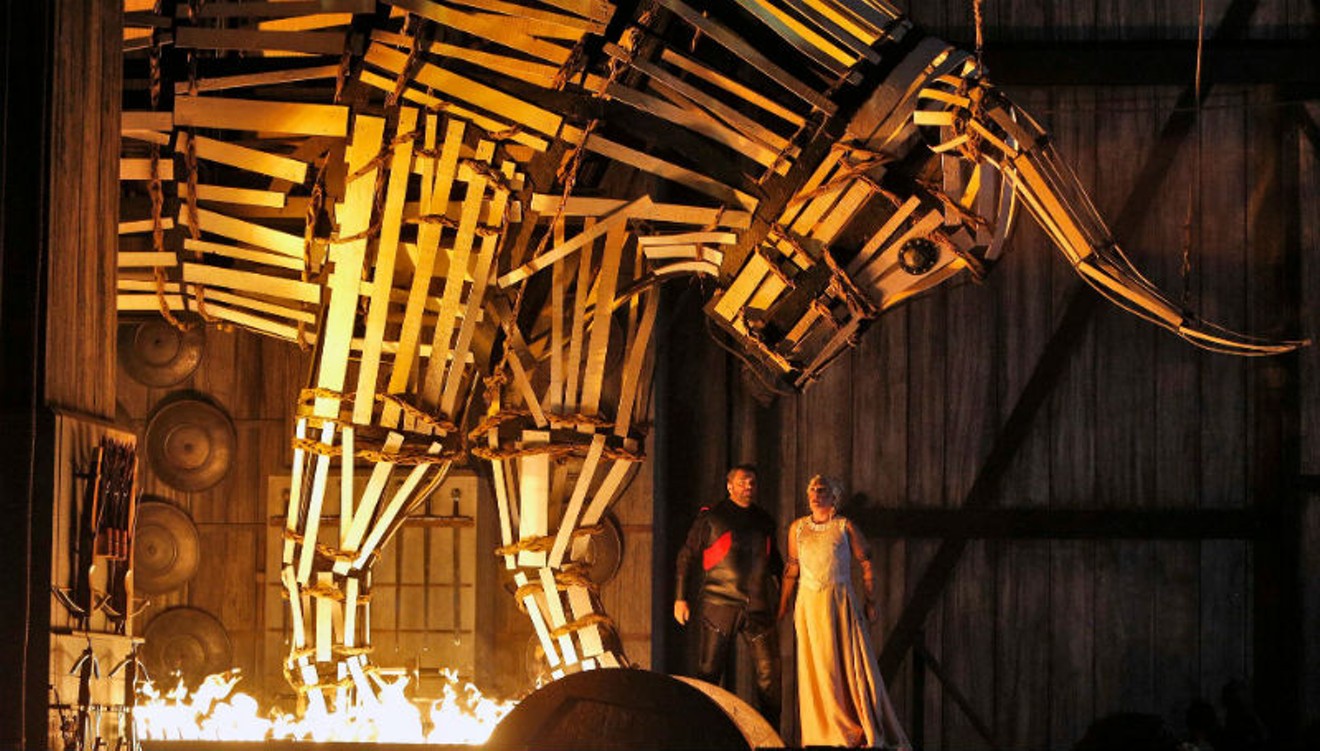Vincenzo Bellini's masterpiece should never play second fiddle to a grilled sandwich.
It happened right in the middle of Act I of Norma (1831), when Druid priestess Norma confronts her best friend, virgin-in-waiting Adalgisa, about her fling with Norma's boyfriend Pollione, the Roman general who's conquered the Gauls and fathered Norma's two children. This scene is one of the opera's innumerable theatrical highlights, a fiery bodice-ripper that foreshadows Verdi, who would put an end to the spinning, melodious bel canto operas of Rossini, Donizetti...and Bellini. You can hear the shift into the modern. It's as if Bellini bids goodbye to the opera style he mastered so indelibly.
But the fragrant distraction was unavoidable. From the nearby bistro beyond the curtains, the sweet meaty aroma of a bratwurst and sauerkraut panini had wafted into Houston Grand Opera's Resilience Theater. I was lost immediately. It beckoned. Unfortunately, I had been lost scenes before.
This quintet production between HGO, San Francisco Opera, Lyric Opera of Chicago, Canadian Opera Company, and Gran Teatre del Liceu is turgid, flaccid, and unforgivably dull, traits that Bellini's beauty is never known for. I blame director Kevin Newbury, who seems to be completely in absentia. Choristers meander when they should rush; principals pose when they should strut; the pace stumbles and falters when it should gallop; and maestro Patrick Summers needs a double whammy of Benzedrine.
The original Norma is gorgeous in all the right ways. Felice Romani's libretto is taut, stringent, pure; and Bellini's music is entirely sublime, there's no other word for it. It works on every level. What aria anywhere compares to the luscious intricacies of “Casta diva,” what duets to “Mira, o Norma” and “In mia man;” what chorus to rousing “Guerra! Guerra!”?
So why does HGO's Norma sound so anemic? It's not mezzo Jamie Barton as Adalgisa. This former HGO Studio Artist and conquering international singer supplies heft, smoky velvet tone, and incomparable artistry to good girl gone bad then good. Sometimes a second lead makes this opera her own – Marilyn Horne immediately comes to mind. When you hear Barton's glorious plangency, you want this opera renamed Adalgisa. She walks away with this production on a platter.
Tenor Chad Shelton, another Studio Artist with a burgeoning career, sounds uncomfortable as hot Roman lover Pollione. He seems stuck in the '50s, blaring Bellini's finely crafted musical lines but never connecting to us or his fellow actors. Act II finds him in better voice, but we never believe he's the reason for all the Druidic commotion. Bass Peixin Chen's Oroveso, Norma's father and High Priest, has vocal grandeur and the worst fake beard ever; while soprano Yelena Dyachek, as nurse Clotilde, emits stage presence and a shimmering voice in a rather thankless role. (She's sung the Composer in Strauss's Ariadne auf Naxos, Tatiana in Tchaikovsky's Eugene Onegin, and the fiendishly difficult Elettra in Mozart's Idomeneo, is she ready for Norma?)
But the sandbag has to fall on soprano Liudmyla Monastyrska, whose Norma resembles a bus-and-truck Mae West in I'm No Angel. What Druid in 50 B.C. looks like a blond bombshell in spangly corset and wispy silk lounge wear? (There's a pyre ready for costumer Jessica Jahn.) Monastyrska doesn't have the voice for it, either, whispering through her showstopper “Casta diva” or playing grande dame, a la Bernhardt, as she lurches and vamps through her ancient mythic movements. Why didn't director Newbury stop her?
As the quintessential bel canto role, Norma requires flexibility, ethereal breath control, acting chops, and steely resolve. Monastyrska certainly floats some beautiful passages way up in the stratosphere, but they come at a cost. She has to pause and refocus before she hits that treacherous filigree, and the stop-and-go plays havoc with Bellini's seamless fluidity. She's not very discreet as singer or actor. We've heard her at HGO in both title roles of Aida (2013) and Tosca (2015), and our opinion of her volcanic voice has not wavered. She can be loud or soft, but there's not much middle. Subtlety is not her forte.
However, to be fair, the acoustics in Resilience Theater are horrendous. Everyone – chorus, soloists, orchestra – sounds tamped down and muffled. When the chorus stands before us, all 50 strong, they sound like ten. It's a problem HGO hasn't been able to surmount, even when the orchestra is positioned to the left on the hall's floor, as here in Norma and its previous production, West Side Story. Putting the musicians behind the stage was a disaster, but this placement doesn't work any better. Why not put the orchestra where it's most advantageous: in front of the stage? Yes, HGO will lose some seats and precious revenue, and while I realize the current configuration is probably the best of all possible worlds, the best of opera is not being served.
Grand opera is blessed by a panoply of immortal works, each more relevant as the centuries go by. Norma is one of the grandest. This production sounds like a leftover. But the HGO paninis are very tasty.
Norma continues at 2 p.m. April 29; 7:30 p.m. May 5, May 8 and May 11 at Houston Grand Opera, Resilience Theater, George R. Brown Convention Center, 1001 Avenida De Las Americas. For information, call 713-228-6737 or visit houstongrandopera.org. $25-$325.
Support Us
Houston's independent source of
local news and culture
account
- Welcome,
Insider - Login
- My Account
- My Newsletters
- Contribute
- Contact Us
- Sign out
Bellini's Beauty Somewhat Dulled in This HGO Production of Norma
D. L. Groover April 29, 2018 6:00AM

The fires were somewhat tamped down in this production alas.
Photo by Cory Weaver
[
{
"name": "Related Stories / Support Us Combo",
"component": "11591218",
"insertPoint": "4",
"requiredCountToDisplay": "4"
},{
"name": "Air - Billboard - Inline Content",
"component": "11591214",
"insertPoint": "2/3",
"requiredCountToDisplay": "7"
},{
"name": "R1 - Beta - Mobile Only",
"component": "12287027",
"insertPoint": "8",
"requiredCountToDisplay": "8"
},{
"name": "Air - MediumRectangle - Inline Content - Mobile Display Size 2",
"component": "11591215",
"insertPoint": "12",
"requiredCountToDisplay": "12"
},{
"name": "Air - MediumRectangle - Inline Content - Mobile Display Size 2",
"component": "11591215",
"insertPoint": "4th",
"startingPoint": "16",
"requiredCountToDisplay": "12"
}
,{
"name": "RevContent - In Article",
"component": "12527128",
"insertPoint": "3/5",
"requiredCountToDisplay": "5"
}
]
KEEP THE HOUSTON PRESS FREE...
Since we started the Houston Press, it has been defined as the free, independent voice of Houston, and we'd like to keep it that way. With local media under siege, it's more important than ever for us to rally support behind funding our local journalism. You can help by participating in our "I Support" program, allowing us to keep offering readers access to our incisive coverage of local news, food and culture with no paywalls.
D.L. Groover has contributed to countless reputable publications including the Houston Press since 2003. His theater criticism has earned him a national award from the Association of Alternative Newsmedia (AAN) as well as three statewide Lone Star Press Awards for the same. He's co-author of the irreverent appreciation, Skeletons from the Opera Closet (St. Martin's Press), now in its fourth printing.
Contact:
D. L. Groover
Trending Arts & Culture
- Mayerling: A Dark Story With Beautiful Dancing Returns to Houston Ballet
- Top 5 Sickest Stephen King Sex Scenes (NSFW)
- Climbing Into Comedy at Main Street Theater with Alan Ayckbourn's Taking Steps
-
Sponsored Content From: [%sponsoredBy%]
[%title%]

Don't Miss Out
SIGN UP for the latest
arts & culture
news, free stuff and more!
Become a member to support the independent voice of Houston
and help keep the future of the Houston Press FREE
Use of this website constitutes acceptance of our
terms of use,
our cookies policy, and our
privacy policy
The Houston Press may earn a portion of sales from products & services purchased through links on our site from our
affiliate partners.
©2024
Houston Press, LP. All rights reserved.





